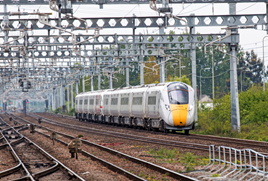The Western Route Supervisory Board sat down to its first meeting at Paddington in April, in what is the industry’s latest effort to improve the running of Britain’s railways by increasing the level of integration between track and train operators.
Comprising Network Rail’s Western Route Managing Director Mark Langman, the MDs of operators Great Western Railway (Mark Hopwood) and Heathrow Express (Fraser Brown), plus passenger representation from Nina Howe of Transport Focus, the Board will meet every four weeks until the end of 2017, to trial the concept before its expected network-wide rollout early next year.
Its purpose is simple: to enhance joint planning, and to induce the creation of co-ordinated action plans to improve the passenger experience. Firmly within this remit, it will also be tasked with limiting disruption to services on a route that is currently undergoing significant investment in infrastructure and rolling stock, under the Intercity Express Programme and the much-criticised Great Western route modernisation.
Announced by Network Rail in February, this pilot scheme has its origins in NR’s wider strategy to devolve greater powers to route level, as advocated by the McNulty report in 2011 and by the Shaw report in 2016.
Both Sir Peter Hendy (NR Chairman) and Mark Carne (NR Chief Executive) have made decentralisation a priority under their leadership of NR, to improve the infrastructure company’s customer responsiveness and financial discipline. Their chosen method to achieve these goals has been to empower their eight Route MDs with much greater authority over decisions concerning procurement and expenditure, while enacting the structural changes that are needed to enable them to work much closer with train and freight operators.
Under this policy, routes have already been able to enter into formal operational alliances, and to align objectives through new scorecards. Going one step further, full vertical integration will be trialled in an isolated and targeted experiment by East West Rail, to reinstate the mothballed Varsity Line between Oxford and Cambridge over the next decade. Further details will be available once the findings are known of a scoping report (written recently but not yet published) by EWR Chairman Rob Brighouse.
The man challenged with making the first Supervisory Board a success is career railwayman Dick Fearn, whose independence from NR will help ensure that the voices of all parties are given equal weight during forthcoming discussions. He is also a lifelong advocate of devolved responsibility as a more effective means of running the railway.
Having held senior management positions at British Rail, Railtrack, Irish Rail and former operator South Eastern (see panel, page 50), Fearn is not only well-respected by industry, he also has valuable practical experience of decision-making from both the track and train operators’ perspectives.
He explains: “I have to bring my experience as one of the inputs to the party. I think one of the reasons I’ve been asked to do this is because I’ve had experience in the UK and Ireland managing railways at times of great change.
“I’m completely independent, and I have seen things from an operational view and vice-versa. One thing I have said is that everybody around this table is of equal value to me.
“I very firmly believe in a devolved railway, and one of the first things I did when I went to Ireland was to create route-based general managers. It worked very well for me, so when I was asked by Mark Carne to get involved in this Board as an independent chairman, I said yes straightaway.
“I now have to demonstrate that there’s a real keenness to develop Route Boards around the nation, so it’s very important to show the primary stakeholders that this is a good idea and it’s working.”
Although the idea has been publicly championed by Network Rail, Fearn is keen to stress at this early stage the guiding principle that the Supervisory Board is a joint enterprise, co-sponsored and co-funded by all its participants.
The primary target is to prove that the mutual benefits on offer from forming closer working relationships will be sufficient to repay each participant’s faith in the Board - in order to ensure its continuation beyond the end of the pilot, and to generate an appetite for Boards on other routes.
Fearn adds: “Mark Carne and Sir Peter Hendy are 100% behind this, and it has executive support from the Secretary of State for Transport and by extension the DfT . But I think what is more important than that, is that all the main TOC-owning (train operating company) groups are behind it - in particular the ones operating on the Western.
“There are particular benefits to smaller TOCs such as Heathrow Express because they get a shout that, without this opportunity, they might not. They are operating for just a few miles at the London end of the Great Western Main Line (GWML), on a route dominated by GWR. They might not get their voice heard over a big dominant operator normally, so the answer is a Route Board which gives a voice at the table to all players.















Login to comment
Comments
No comments have been made yet.